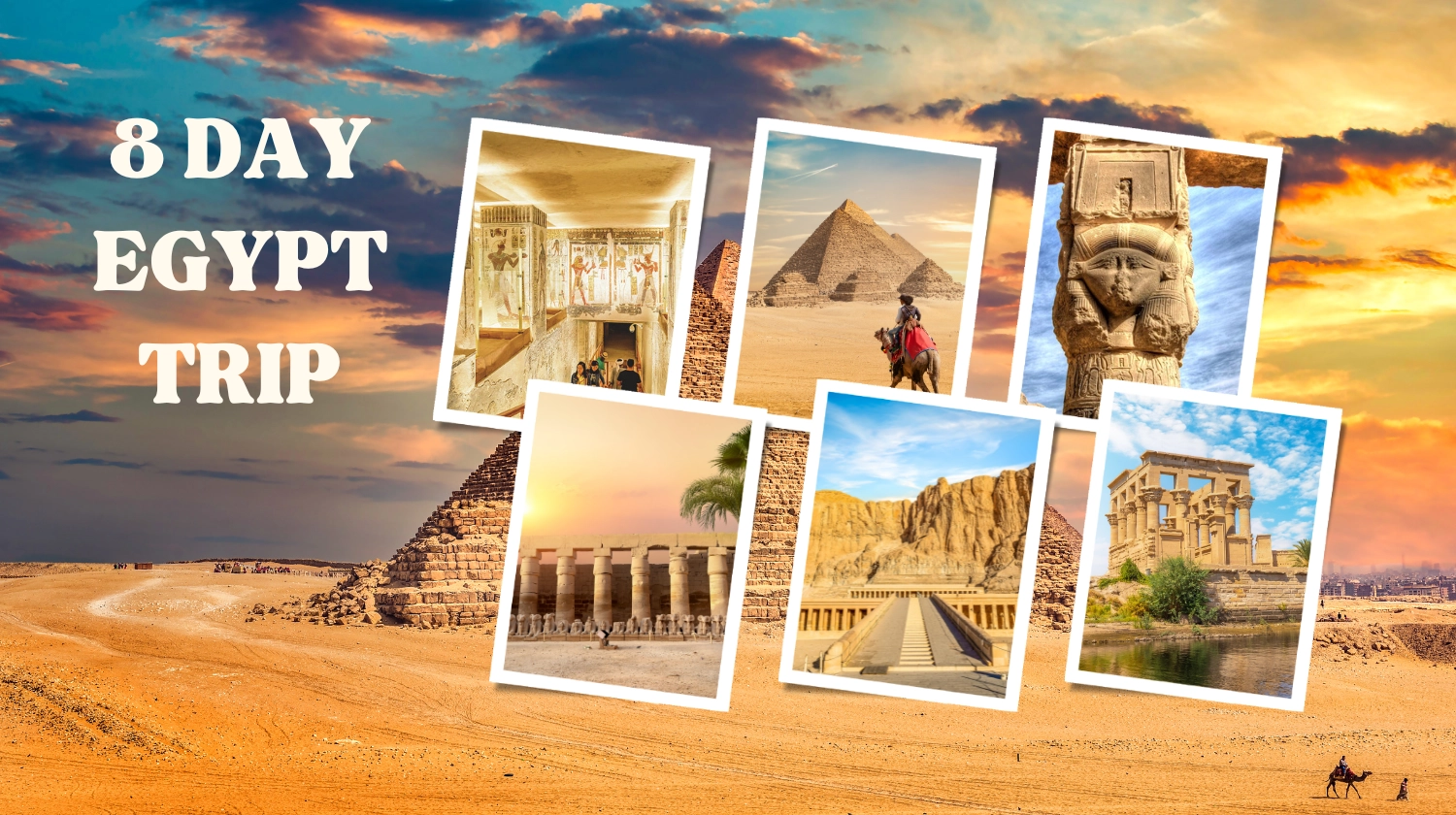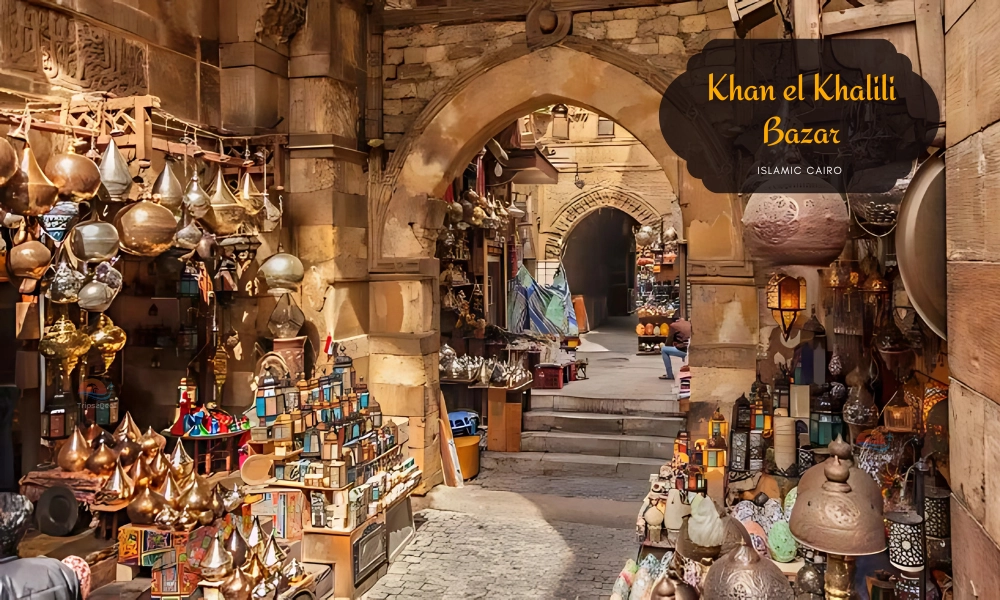Blogs
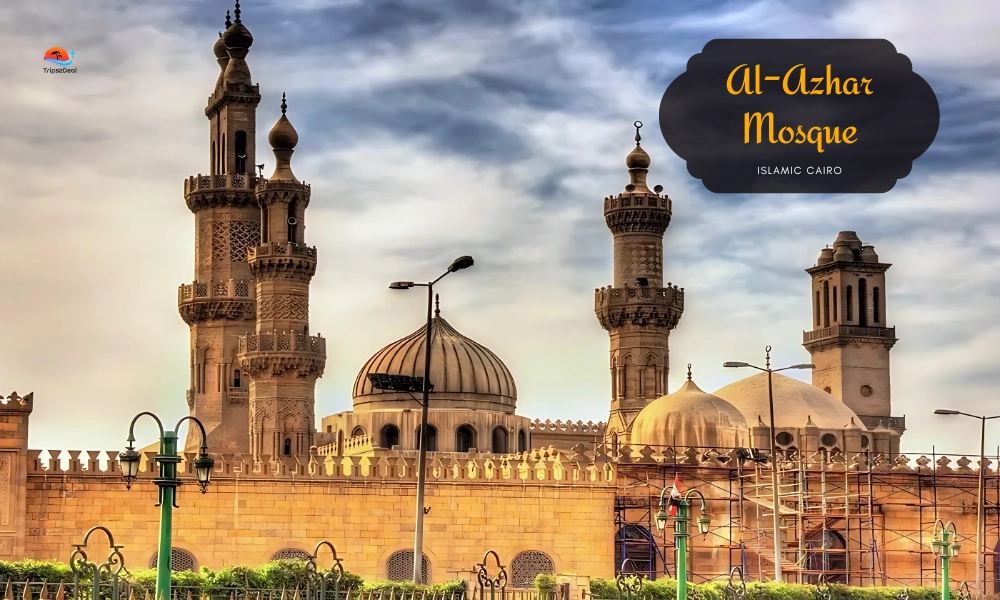
Al-Azhar Mosque
Once you step into the heart of Islamic Cairo, you feel the energy of a place that maintains spirituality and knowledge at the same time, the place known as the Al-Azhar Mosque. Along with standing as a most beautiful mosque that too for over a thousand years, it is also a global center of Islamic learning. Walking through its marble courtyards, surrounded by elegant arches and minarets, one can almost hear the whispers of scholars and students who shaped Islamic thought across centuries.
If you want to enjoy and be part of this mosque’s journey of foundation, architectural brilliance, cultural significance, and modern-day role, then explore this guide right away. You’ll get to know the reason why Al-Azhar Mosque in Cairo still remains a timeless beacon.
Table of Contents
- 1. History Behind the Foundation of Al-Azhar Mosque
- 2. Al-Azhar as the Cradle of Islamic Learning
- 3. Architectural Evolution Through the Ages
- 4. The Spiritual Atmosphere Inside Al-Azhar Mosque
- 5. Al-Azhar’s Role in Islamic Civilization and Politics
- 6. Al-Azhar University: A Global Hub of Islamic Education
- 7. Al-Azhar Mosque in Art, Literature, and Popular Culture
- 8. Modern-Day Significance of Al-Azhar Mosque
- 9. Interesting Facts and Stories About Al-Azhar Mosque
- 10. Al-Azhar’s Influence Beyond Egypt
- 11. Recent Restoration Efforts and Preservation
- 12. Visiting Al-Azhar Mosque: A Traveler’s Guide
- 13. Nearby Attractions to Complete the Journey
- Conclusion
1. History Behind the Foundation of Al-Azhar Mosque
So, the story of Al-Azhar Mosque begins during the Fatimid rule in Egypt, in the year 970 CE. This mosque was built when Caliph al-Mu’izz li-Din ordered Fatimid general Jawhar al-Siqilli. Under their commission, it was carefully designed and constructed to blend both spiritual authority and political power.
- Who built it? Jawhar al-Siqilli, a brilliant general and city planner.
- When? Construction began in 970 CE and was completed in 972 CE.
- Why “Al-Azhar”? The name derives from al-Zahra (“The Radiant”), an epithet of Fatimah al-Zahra, the daughter of Prophet Muhammad.
In the early stages, the mosque was featured with both political references and spiritual purposes, becoming one of the most important centers of focus for muslims from all over the world.
2. Al-Azhar as the Cradle of Islamic Learning
Moreover, soon after its foundation, Al-Azhar evolved into much more than a mosque. It eventually became the first university in the Islamic world, and is now often considered the oldest continuously operating university in the world as well.
- Al-Azhar University was formally established in 975 CE.
- Scholars here preserved and taught Quranic sciences, Islamic jurisprudence, theology, and Arabic grammar.
- During different dynasties, it served both Sunni and Shi’a traditions, reflecting Egypt’s diverse Islamic history.
If you walk through its lecture halls today, you’ll get to visualize the debates, recitations, and discussions that once filled the air. Not only that students from across the Muslim world, Africa, Asia, and beyond flock here, making Cairo the intellectual capital of Islam.
3. Architectural Evolution Through the Ages
Moreover, over the centuries, the rulers of Egypt in their dynasty have reshaped the architectural structures and classic design of Al-Azhar Mosque. This transformation has passed the imaginative featuring design in each mind, visiting there. These advancements make it a landmark icon and a remarkable masterpiece.
- Fatimid Era: Original structure with five aisles and simple columns.
- Ayyubid and Mamluk Periods: Addition of minarets, elaborate courtyards, and decorative mihrabs.
- Ottoman Influence: Expansions including domes, prayer halls, and ornate calligraphy.
- Modern Renovations: Preservation of stucco carvings, marble flooring, and historic minarets.
Key features include:
- Minarets: Each dynasty added unique styles, making Al-Azhar a gallery of Islamic architecture.
- Courtyard: Spacious, white marble flooring that glistens under Cairo’s sun.
- Prayer Halls: Designed for both intimate prayers and grand congregations.
As you step in, feeling the essence of the walls, you will find each corner of the mosque is a story in itself. An imaginative story of faith, power, and design.
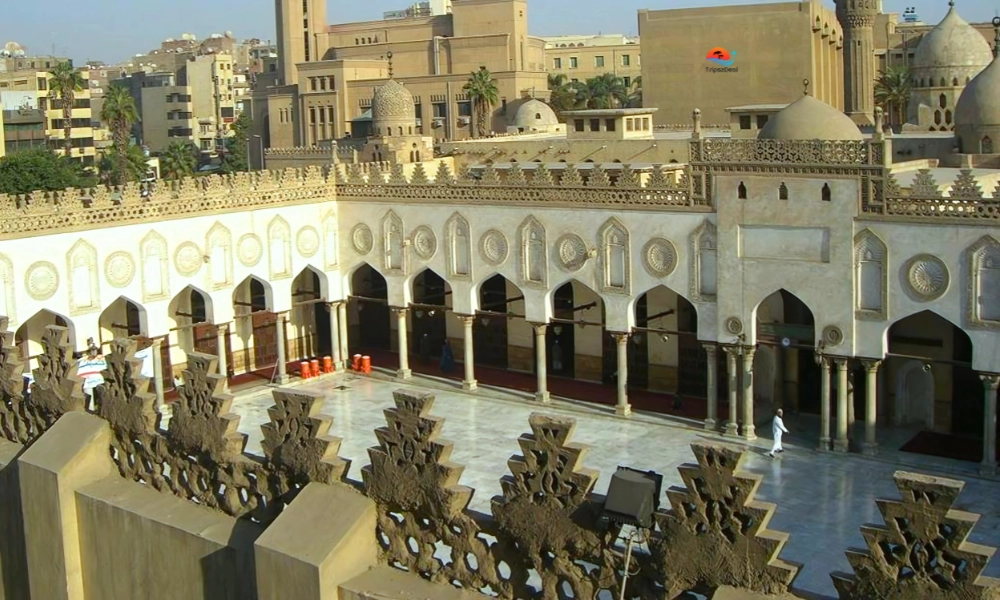
4. The Spiritual Atmosphere Inside Al-Azhar Mosque
For Muslims and tourists, visiting Al-Azhar Mosque in Cairo is not just a tour, but it's far more than that. It is like a deep spiritual experience for them. Because as soon as you set foot inside, you’ll notice that the noises of Cairo fade away slowly. The more you go inside, the more you’ll feel the calm rhythm of Quran recitations.
- During Fajr prayer (dawn), the mosque is filled with soft light, creating a tranquil start to the day.
- In Ramadan, worshippers gather in thousands, filling the mosque with devotion, charity, and late-night prayers.
- Students still gather in small study circles (halaqas), keeping alive the same traditions practiced for over a thousand years.
For those who love architecture, classic design, and Islamic art, while smelling the wall's artistic fragrance, it feels like time stops there. This is an iconic symbol of connecting faith and scholarship from the past to the present. Moreover, it also opens a gateway for future transformation.
5. Al-Azhar’s Role in Islamic Civilization and Politics
If we talk about the historical importance, the Al-Azhar Mosque in Cairo was not a remarkable place of worship but a spot for both political voices and cultural institutions. It has had a strong influence in past centuries. Visitors love to visit it because it delivers a blend of power, faith, and art.
- Crusades Era: Scholars issued guidance to resist invasions.
- Ottoman Period: Became a key religious authority in resisting colonial influence.
- Colonial and Post-Colonial Egypt: Al-Azhar scholars often led reformist movements and political debates.
It is not only about the past, but still today, Al-Azhar's fatwas and judicial statements hold a weight, strong knowledge in shaping discussions on faith, politics, and social issues all over the world. When a mosque contains a strong rank, it is considered the most empowering and powerful location in the Islamic world.
6. Al-Azhar University: A Global Hub of Islamic Education
In the beginning, it was a mosque only. But now it has become a global and well-known institution. It has been expanded from Al-Azhar Mosque to Al-Azhar University. Students from all over the muslim countries can learn Shariah, Fiqh, and other Islamic subjects.
- International Reach: Students from over 100 countries study here.
- Curriculum: Balances traditional Islamic sciences with modern disciplines.
- Fatwa Authority: The Dar al-Ifta al-Misriyyah (Egyptian Fatwa House) issues guidance rooted in Al-Azhar’s tradition.
Nowadays, this University has become a top-ranked choice among Islamic universities. This explains the importance of moderate Islam, empowering a peaceful environment.
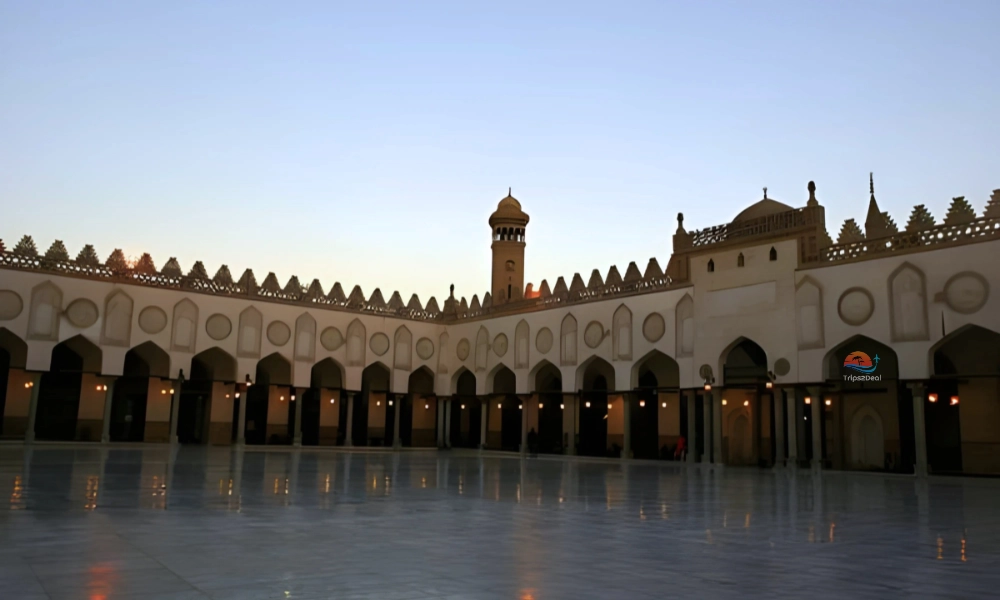
7. Al-Azhar Mosque in Art, Literature, and Popular Culture
Al-Azhra mosque has a great significance and impact in the domain of art, literature, and culture. There has been proper academic research done on this as well. It inspires many people, including artists, writers, and filmmakers. Both local and foreign visitors mention it in their Arabic poetry, travel blogs, and paintings.
- Literary Works: Egyptian writers such as Naguib Mahfouz, a Nobel Prize laureate, often referenced Al-Azhar as a backdrop in stories about Cairo’s identity and spirituality.
- Films and Documentaries: Al-Azhar frequently appears in Egyptian cinema and international documentaries exploring Islamic history and Cairo’s urban fabric.
- Photography and Modern Media: Tourists and scholars continue to photograph its iconic courtyards, contributing to global appreciation of Islamic architecture.
8. Modern-Day Significance of Al-Azhar Mosque
This is the modern era, this Mosque fulfills the Islamic requirements and behaves as:
- A symbol of moderate Islam.
- A hub for interfaith dialogue, often hosting conversations with Christian and Jewish leaders.
- A place of daily prayers, Quran recitations, and Ramadan gatherings.
If you're a traveller, an explorer, and a history-seeker, you’ll find that this mosque delivers a blend of spiritual framework and historic cultural legacy, making it one of the most-visited Cairo mosques.
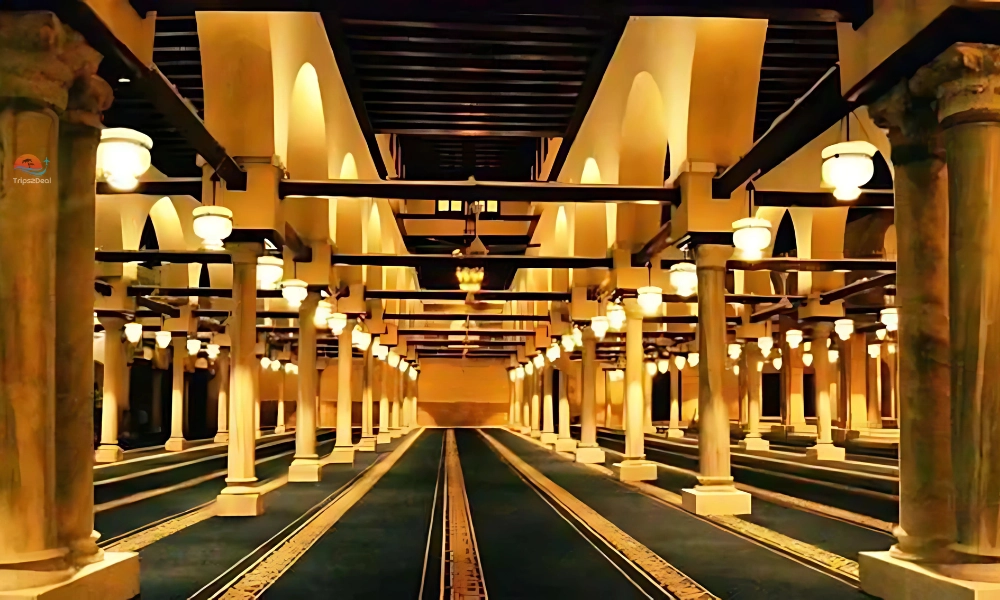
9. Interesting Facts and Stories About Al-Azhar Mosque
- Oldest University in the World: Many historians argue that Al-Azhar predates even Europe’s oldest universities.
- Diverse Dynasties: Unlike many mosques, it reflects Fatimid, Ayyubid, Mamluk, and Ottoman layers.
- Famous Visitors: Scholars like Ibn Khaldun and travelers like Napoleon Bonaparte admired its significance.
- Legends: Some say students once studied by candlelight through the night, filling Cairo with a glow.
Discovering these interesting stories adds value, charm, and artistry that do not make it unique but offer a living heritage.
10. Al-Azhar’s Influence Beyond Egypt
Though rooted in Islamic Cairo, Al-Azhar’s voice reaches far beyond Egypt’s borders.
- Africa: Al-Azhar-trained scholars became teachers and leaders in Sudan, Nigeria, and East Africa.
- Asia: From India to Indonesia, Al-Azhar alumni spread Islamic jurisprudence, Arabic language, and Quranic sciences.
- Europe & Americas: Its graduates established mosques, universities, and interfaith initiatives, strengthening Muslim communities abroad.
Furthermore, to this date, Al-Azhar remains a global symbol of moderate Islam. Scholars use it as a reference during various events like international conferences, issuing fatwas, and shaping debates on faith in the modern world.
11. Recent Restoration Efforts and Preservation
Preserving such an ancient mosque is a challenge.
- The government and NGOs have invested in cleaning marble, reinforcing foundations, and protecting manuscripts.
- UNESCO and International partners recognize Al-Azhar as part of Islamic Cairo’s World Heritage Site.
- Future Plans: Enhanced facilities for tourists, digital archives of manuscripts, and eco-friendly preservation.
12. Visiting Al-Azhar Mosque: A Traveler’s Guide
If you take a trip to Cairo and don't visit Al-Azhar Mosque, then you missed the whole point of your trip. It is one of the city’s most historic and sacred landmarks means must a must-see. Doesn’t matter whether you are a history lover or just a curious traveller, this mosque will leave you in a fascinating state no matter what.
Practical Visitor Information
Planning your visit well can transform a simple stop into a meaningful journey:
- Location: The mosque is nestled in the heart of Islamic Cairo, only a short walk from the bustling Khan el-Khalili Bazaar. Its central position makes it easy to include in a cultural walking tour.
- Best Time to Visit: Morning: Ideal for those who prefer peaceful exploration, as the mosque is quieter and filled with soft daylight that enhances its marble courtyards. Evening: Perfect for experiencing the mosque when it comes alive with worshippers, surrounded by Cairo’s vibrant night atmosphere.
- Entry: Admission is free, though small donations are welcome to support maintenance and upkeep.
- Must Etiquettes: There are some etiquettes every visitor should follow. Like in dress manners, modesty is the priority. Shoulders and knees covered. Before entering, remove your shoes and respect the worshippers there. Similarly, photographers are usually permitted, but avoid doing so.
13. Nearby Attractions to Complete the Journey
A visit to Al-Azhar Mosque is often paired with other cultural treasures in Cairo:
- Khan el-Khalili Bazaar: Famous for its labyrinth of shops, offering everything from spices to handmade jewelry.
- Mosque of Sultan Hassan: An architectural marvel, showcasing Mamluk grandeur and located nearby.
- The Cairo Citadel: A majestic fortress that provides panoramic views of the city’s skyline.
Hence, together, these sites create a rich cultural circuit, making Al-Azhar Mosque not just a place of worship but also the gateway to Cairo’s living history.
Conclusion
It will be right to say that the Al-Azhar Mosque in Cairo is far more than just a monument; instead, it is a living symbol of faith, knowledge, and resilience all in one. Additionally, you can see that from its Fatimid origins to its modern-day role as a global Islamic university, it continues to shape Egypt and the wider Muslim world.
Not only that for visitors, but it also offers a chance to walk through history, experience Islamic heritage, and witness how one mosque became the heartbeat of a civilization.
In conclusion, Al-Azhar Mosque not only represents a place in Cairo, but it is also a timeless beacon whose light continues to guide hearts and minds around the world to this day.




